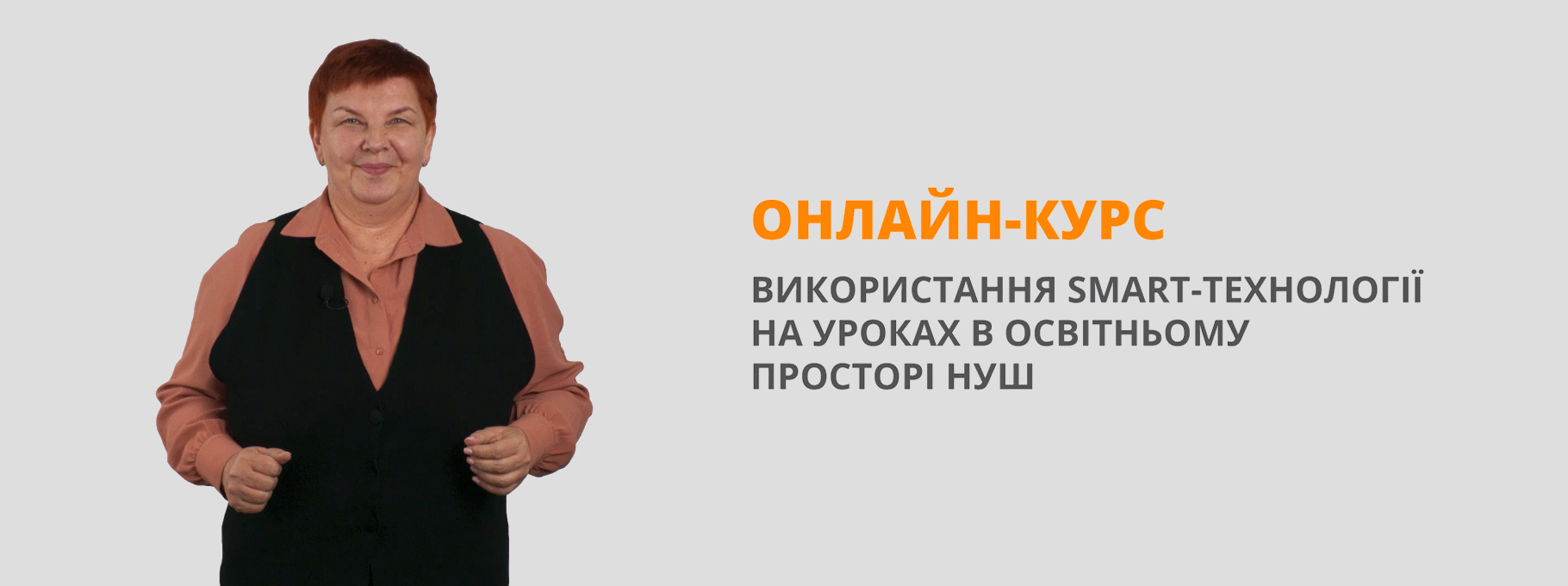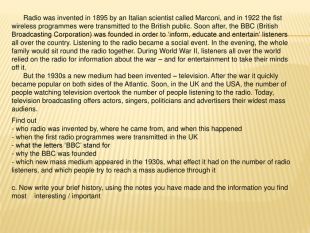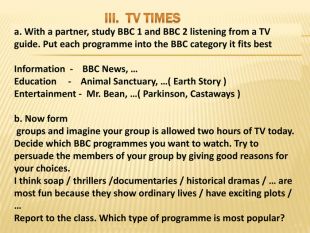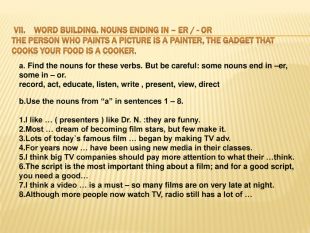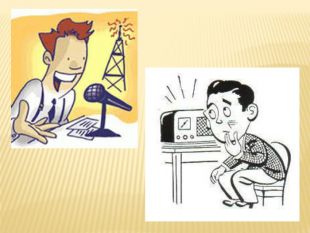How do you get to know the news.
















1 How do you usually choose the TV programmes you watch?a. By zappingb. By looking at the listings in a news- paper or TV magazine.c. By watching what someone else in the family is already watching.2 What are your viewing habits?a. I watch TV every afternoon – I don`t really care what`s on.b. I watch my favourite programme, and then I usually leave the TV on and Watch whatever comes next.then I turn off the TV and do something else.3 How many minutes a day do you spend reading a book for pleasure?a. Less than 30 minutes.b. 30 – 60 minutes.c. More than 60 minutes. 4 How do you read a magazine or newspaper?a. I check the table of contents to decide which articles I want to read.b. I leaf through it and read the articleswha with the most interesting headlines.c. I just look at the pictures and captions.5 Why do you usually use a computer?a. To play a certain game in my free time.b. To get help with my homework.c. To play any game that`s around when I should be doing my homework.6 Why do you mainly use the Internet?a. To surf and “see what`s out there”.b. To get information I need.c. To chat when I`m bored.7 Why do you usually turn on the radio?a. To listen to a specific programme.b. To have some background noise.c. To annoy my parents.8 How do you react to radio or TV ads?a. I don`t take any notice of them.b. I listen/watch because they are sometimes funny, but that doesn`t affect what I buy.c. I sometimes buy things just because of an ad. 9 Suppose you`ve never been to the ballet and a friend invites you. What do you say?a. No – I think the dancers look silly in those costumes.b. Yes – I want to find out what it`s like.c. No – I don`t know if I`ll like it. 10 You decide to go to the cinema, but don`t know which film to see. What do you do?a. I get out a magazine and check the film review page.b. I go to the cinema, find the most glamorous poster and see that film.c. I choose a film that`s on at the time I want to go. І. You and the media – a quiz. Read each question and then choose the answer that best/most often applies to you.
ІІ. How did you score? Check your points and add them up.{5 C22544 A-7 EE6-4342-B048-85 BDC9 FD1 C3 A}abc1241212431344431534162417321823191411041230 points or more. Very good! You seem to use the media well: you gostraight for the contents you want or need, and youdon`t waste time. But don`t forget to enjoy yourself,too!Less than 15 points. You don`t use the media, the media use you! Try tobe a bit more critical about when and why youswitch on.. Whatever your score, as you go through this unit, keep thinking about how much you watch, surf, listen, etc. The broadcasters, the providers, the advertisers – they all want to ‘hook’ you: Do they succeed?15 – 29 points. You understand the media pretty well. But watch out:you sometimes let yourself be trapped by them. Next time you switch on the computer or the TV,think about why you are doing it. Your points
ІІІ. Unit task A magazine programme make a radio or TV magazine programme for people your age. It can concentrate on one topic or have lots of different topics. You can record your programme or perform it ‘live’ for the class, without any equipment. Here are some tips and ideas: Will you choose TV or radio? Audio makes your audience use their imagination, but video helps them see what you are talking about. What will the tone and style be? (Serious, funny, trendy, …) How many sections will your programme have? What will the subject of each section be? Who does what, and when? (Research, writing, graphics, recording, editing, presenting, …) How will you put the programme together? You could link the sections with presenters/ graphics/ music/ …
Media products. The book was published / translated / banned /…The film was released in May. A live programme / a recorded programme. To produce a talk show/ documentary/ series/soap (opera) / comedya phone – in programmeto research a topic (for a documentary)to cast smb. as a detectivegraphics (pl) photography. There`s a new play opening at the… theatre. The programme was transmitted / broadcast/shown…a current affairs programmea magazine programmescriptwriter / (costume) designer/producer /director / editor / presenterto edit the highlights of a match soundtrack
Presenting a programme. Hello and welcome to …Our topic today is …Tonight we are discussing / looking at …My next guest is …Back to the studio. Over to our reporter at the scene of the … / in…We`ll be back after the (commercial) break with…Our next report / film is about / looks at …That`s all we have time for today. Thank you for listening / watching. That`s all from me, …
Broadcast ImagesІ. Radio times What do you and other members of your family listen to on the radio? When? Why? Who with?Does radio still bring families together? If not, why not – and what does? ІІ. The changing face of broadcastinga. Work in pairs. Read the text and answer your partner`s questions.b. The box below tells you what information you can get from your partner. Ask him / her questions and make notes on the answers.
Radio was invented in 1895 by an Italian scientist called Marconi, and in 1922 the fist wireless programmes were transmitted to the British public. Soon after, the BBC (British Broadcasting Corporation) was founded in order to ‘inform, educate and entertain’ listeners all over the country. Listening to the radio became a social event. In the evening, the whole family would sit round the radio together. During World War II, listeners all over the world relied on the radio for information about the war – and for entertainment to take their minds off it. But the 1930s a new medium had been invented – television. After the war it quickly became popular on both sides of the Atlantic. Soon, in the UK and the USA, the number of people watching television overtook the number of people listening to the radio. Today, television broadcasting offers actors, singers, politicians and advertisers their widest mass audiens. Find out- who radio was invented by, where he came from, and when this happened- when the first radio programmes were transmitted in the UK- what the letters ‘BBC’ stand for- why the BBC was founded- which new mass medium appeared in the 1930s, what effect it had on the number of radio listeners, and which people try to reach a mass audience through itc. Now write your brief history, using the notes you have made and the information you find most interesting / important
Text ІІ. The changing face of broadcastinga. You and your partner each have a text with some of the information you need to write a brief history of broadcasting. Read the text. Ask him/her questions and make notes on the answers. Until the laten1940s, radio was the mass medium through which millions of people received news and entertainment in their own homes. In 1938, for example, millions of Americans listened to the famous adaptation, by the actor Orson Welles, of the novel War of the Worlds – and really thought the men from Mars had landed on Earth. But with the arrival of moving pictures in the living-room, radio became less popular as the focus of family entertainment. People in the UK and the USA still listened to the radio while they worked – factory workers, housewives and schoolchildren. And with the arrival of the car and transistor radios, they found they could listen to news, weather and traffic reports, sport and music wherever they went. So, slowly radio`s role in Western society began to change. For millions of people in developing countries, radio is still the only mass medium available. It may be many decades before television catches up with it.what sorts of programmes people used to listen to who made War of the Worlds, when, and why the programmer frightened peoplewhat took over as the main family entertainmentwho still listened to the radiowhat new types of radio gave the medium a new rolewhat people listened to on the new types of radiowhat medium people in the developing world use most Write your brief history, using the notes you have made and the information you find most important
ІІІ. TV timesa. With a partner, study BBC 1 and BBC 2 listening from a TV guide. Put each programme into the BBC category it fits best Information - BBC News, …Education - Animal Sanctuary, …( Earth Story )Entertainment - Mr. Bean, …( Parkinson, Castaways ) b. Now form groups and imagine your group is allowed two hours of TV today. Decide which BBC programmes you want to watch. Try to persuade the members of your group by giving good reasons for your choices. I think soap / thrillers /documentaries / historical dramas / … are most fun because they show ordinary lives / have exciting plots / …Report to the class. Which type of programme is most popular?
IV Role – play. A television talk show. Work in groups of five to act out a television talk show on the topic “Is TV killing family life?” 1 First decide who is going to play which role ( the presenter, someone from the group “Families for family life”, a producer of sports programmes, an actor, a teenager who is still at school). Together make notes for each character.2 Now each group member makes more notes for their own character ( age, background, etc. ) and phrases on a role card.3 Act out the talk show for the class.
V. Is there life without the broadcast media? a. Collect as many words and phrases to do with radio and television as you can. Arrange them in a network, lists, … b. Compare the advantages and disadvantages of radio and TV. Make a list with reasons and discuss it with a partner. c. Would life be better or worse without the broadcast media? Write about a week without radio, TV or the Internet.
VII. Word building. Nouns ending in – er / - or. The person who paints a picture is a painter, the gadget that cooks your food is a cooker.а. Find the nouns for these verbs. But be careful: some nouns end in –er, some in – or.record, act, educate, listen, write , present, view, directb. Use the nouns from “a” in sentences 1 – 8. I like … ( presenters ) like Dr. N. :they are funny. Most … dream of becoming film stars, but few make it. Lots of today`s famous film … began by making TV adv. For years now … have been using new media in their classes. I think big TV companies should pay more attention to what their …think. The script is the most important thing about a film; and for a good script, you need a good…I think a video … is a must – so many films are on very late at night. Although more people now watch TV, radio still has a lot of …


про публікацію авторської розробки
Додати розробку
